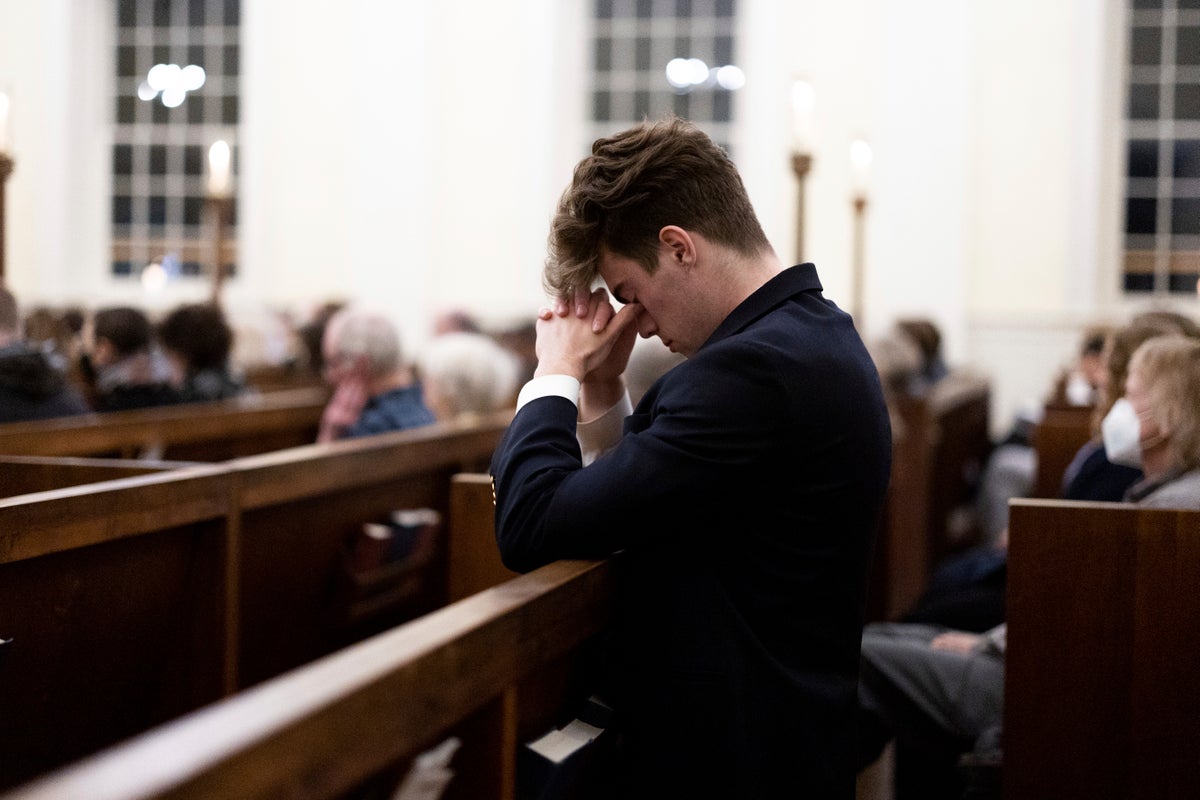
Students huddled inside laboratory closets and darkened dorm rooms across the University of Virginia while others moved far away from library windows and barricaded the doors of its stately academic buildings after an ominous warning flashed on their screens: “RUN. HIDE. FIGHT.”
Responding to the immediate threat of an on-campus shooting was a moment they had prepared for since their first years of elementary school. But dealing with the emotional trauma of an attack that killed three members of the school’s football team late Sunday left students shaken and grasping to understand.
“This will probably affect our campus for a very, very long time,” said Shannon Lake, a third-year student from Crozet, Virginia.
For 12 hours, she hid with friends and other students, much of that time in a storage closet, while authorities searched into Monday morning for the suspect before he was taken into custody.
When Lake and the others heard someone might be right outside the business school building, they all decided to go into the closet, turn off the lights and barricade the door.
“That was probably the most terrifying moment because it became more real to us, and reminded us of those practice school lockdowns as children. And it was just kind of a surreal moment where, you know, I don’t think any of us were really processing what was going on,” she said.
Police charged 22-year-old student Christopher Darnell Jones Jr. with three counts of second-degree murder, saying the three victims were killed just after 10:15 p.m. as a charter bus full of students returned from seeing a play in Washington. Two other students were wounded.
University President Jim Ryan said authorities did not have a “full understanding” of the motive or circumstances surrounding the shooting.
Police conducted a building-by-building search of the campus while students sheltered in place before the lockdown order was lifted late Monday morning.
Charlotte Goeb, a student who lives in an apartment about a half-mile (800 meters) away from where the shooting scene, immediately checked her doors and shut off the lights after getting an alert from the school.
“I’m having a hard time coming to terms that this was happening,” she said. “Even though you spend all of your upbringing knowing this can happen.”
Ellie Wilkie, a fourth-year student, was about to leave her room on the university’s prestigious, historic Lawn at the center of campus when her group texts with friends began exploding with word of the shooting. But she didn’t barricade herself in right away.
“I think our generation has been so habituated to these being drills and this being commonplace that I didn’t even think it was all that serious until I got an email that said, ‘Run. Hide. Fight,’ all caps,” she said.
Wilkie moved a large trunk she uses for storage in front of the door and put her mattress on top of that. She turned off the lights, unplugged anything that might make noise, put her phone on do-not-disturb mode, got under the covers of her top bunk and texted her mom, who called back, terrified.
She picked up but told her mom: “I have to get off the phone now. I can’t be making noise in here.”
University Police Chief Timothy Longo Sr. said the suspect had once been on the football team, but he had not been part of the team for at least a year. The UVA football website listed Jones as a team member during the 2018 season and said he did not play in any games.
It was not immediately clear whether Jones had an attorney or when he would make his first court appearance.
Hours after Jones was arrested, first-year head football coach Tony Elliott sat alone outside the athletic building used by the team, at times with his head in his hands. He said the victims “were all good kids.”
Elizabeth Paul was working at a desktop computer in the Clemons library when she got a call from her mom about the shooting. She thought it was probably something minor until the computer she was using lit up with a warning about an active shooter.
She spent about 12 hours huddled with several others underneath windows in the library, hoping that if gunfire did erupt, they would be out of sight. She spent most of the night on the phone with her mom.
“Not even talking to her the whole time necessarily, but she wanted the line to be on so that if I needed something she was there,” Paul said.
Em Gunter, a second-year anthropology student, heard three gunshots and then three more while she was studying genetics in her dorm room.
She told everyone on her floor to go in their rooms, shut their blinds and turn off the lights. Students know from active shooter drills how to respond, she said.
“But how do we deal with it afterwards?” she asked. “What’s it going to be like in a week, in a month?”







